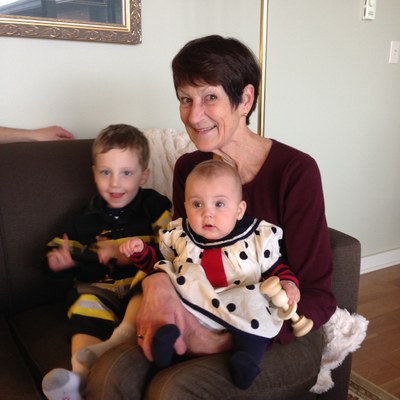The Differences Between Paternal and Maternal Grandmothers
by Jan Faull, M.Ed.

Is it a myth that paternal grandmothers yield to maternal grandmothers? Do you agree with this “rule”? Do you adhere to it, or do you fight it? Has it proven true in your life as a maternal grandmother? Has it proven true for those of you who are paternal grandmothers?
What this rule means is that when the maternal grandmother is holding the newborn grandchild, the paternal grandmother doesn’t horn in; she waits until the maternal grandmother relinquishes the baby to her.
Why would it be so that the mother of the child’s father would play second chair to the mother of the mother in a grandchild’s life? It’s because the mother (now grandmother) and her adult daughter usually hold a close bond, far more intimate than the daughter-in-law and mother-in-law relationship. Plus, the mother of the newborn often parents her baby in much the same way she was parented by her mother; their parenting style is similar, and there’s trust already built into the relationship. When the mother-in-law — and her different, but not necessarily wrong, style — enters this intimate circle, her approach might make the baby’s mother and the maternal grandmother a little uncomfortable. The mother-in-law must prove to her daughter-in-law that she’s reliable, competent and willing to take care of the baby as prescribed by her daughter-in-law, therefore earning a relationship with her son’s children. While the paternal grandmother may never be as close to her daughter-in-law as her daughter-in-law is to her own mother, she can develop her own relationship with her son’s kid(s).
If you feel confident in your position as paternal grandmother and communicate love to your grandchildren, a positive and deep relationship will follow. However, it’s up to you to take the lead.
Now, certainly this is not the case for all paternal grandmothers. Some daughters-in-law are more laid back, open and accepting, while others are more tense when it comes to turning their baby over to the paternal grandmother. And then there are exceptional paternal grandmothers. Take Mary Ann as an example. She has three sons. As her sons each married and began having children, she was determined to have a relationship with her grandchildren. She told each couple before their baby was born that she would take care of the baby and any subsequent children one day a week. What new mom could resist? This is a commitment Mary Ann was willing and able to make and proved to be the entrée into a loving relationship with her grandchildren and a deeper, more committed relationship with her daughter-in-law.
All paternal grandmothers can’t make such a weekly commitment. Some work full time, others live out of town, and some are simply busy with their own lives and want to be involved but not on a weekly, scheduled basis. What do they do? They offer to babysit so Mom and Dad can enjoy a date night. They take the baby overnight every once in a while. They take care of the baby a couple hours on Saturday or Sunday so Mom and Dad can be kid-free for a bit. They’re flexible and can step in when Mom or Dad is sick or has an extended workday. There are lots of ways to build a relationship with your grandchild, even if you don’t hold a position of No. 1 in the eyes of your daughter-in-law.
Yet still, if you’re at a family gathering and the baby-now-toddler and the maternal grandmother are engaged in an activity that is clearly their own, such as singing a special song or playing a unique game known only to them, don’t join in. And whatever you do, don’t compete by then showing off your unique game or song. Hold back. Your moment will come. You’ll have your turn. You’ve put in your time. Your relationship with your grandchild is secure.
Children need lots of people to love and support their growth and development. They benefit when they feel a unique love that comes from each of their grandparents. Competition between grandparents serves no purpose in the child’s life; besides, the paternal grandparent seldom wins such competition. Carve out your unique position in the child’s life, find time for it and all — particularly the child — will view you as the loving paternal grandmother you are.
About The Author
 Jan Faull, M.Ed., has taught Parent Education for more than twenty-seven years. Jan's weekly column Parenting for The Seattle Times ran for ten years.
Jan Faull, M.Ed., has taught Parent Education for more than twenty-seven years. Jan's weekly column Parenting for The Seattle Times ran for ten years.
She is a recognized speaker to a wide variety of local and national organizations. Jan is the author of five books: Mommy, I Have to Go Potty (Raefield & Roberts, 1996); Unplugging Parent-Child Power Struggles: Resolving Emotional Battles with Your Kids Ages 2-10 (Parenting Press, 2000); Darn Good Advice-Parenting (Barrons, 2005); and Darn Good Advice-Baby (Barrons, 2005). Her latest book: Amazing Minds: The Science of Nurturing Your Child's Developing Mind was published in August 2010 by Berkley Books a subsidiary of Penguin.
Jan was a board member for PEPS (Program for Early Parent Support) and currently serves on the PEPS Advisory Board. The mother of three adults and grandmother to three granddaughters, Emilia, Flora and Violet and one grandson, George, she resides in Seattle.
- Sign up for our Grandparent newsletter, featuring topics relevant to grandparents
- Join our PEPS Grandparent Facebook Group
Document Actions